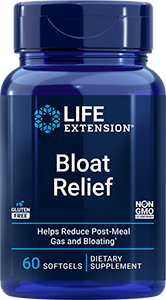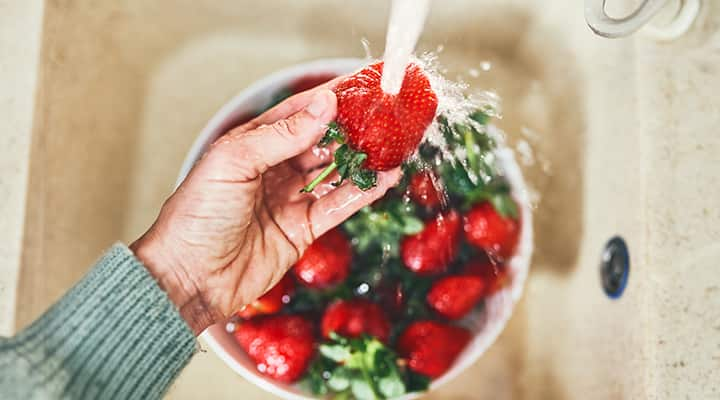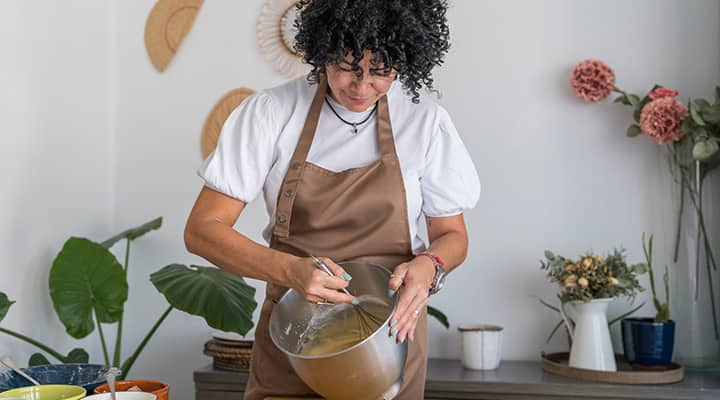
22 Foods & Beverages That Help with Bloating (+Recipe)
Published: June 2022
Have you ever gotten dressed in a pair of pants that fit perfectly when you left the house, but are much too tight around the waist and uncomfortable by the time you got home from your meal? They didn’t change size after dinner—but your belly certainly did!
Chances are, you have experienced bloating at some point or another, whether after a big holiday meal or after ingesting a certain food trigger as simple as a carbonated beverage. Bloating is typically not something to worry about, as it will eventually go away, but you can avoid it—and the need to wear elastic waistbands—with certain eating practices, foods and supplements.
What is bloating?
Belly bloat is when the belly feels full and tight and may look slightly distended. Bloat is commonly caused by swallowing air while eating, occasional constipation, overeating, stress, lactose intolerance, or sometimes hard-to-digest foods. Additionally, a high-sodium diet can be a culprit of a belly bloat.
You probably already know which foods are occasionally gas-inducing, either from personal experience or their reputation. (Ever heard the rhyme about beans being a musical fruit?) Common occasional gas-producing foods that may lead to bloating include cruciferous vegetables like brussels sprouts and cabbage, beans, dairy products containing lactose, sugar alcohols, sugar-free chewing gum, and carbonated drinks.
Additionally, FODMAPs can be a culprit. FODMAPS are short-chain carbohydrates that the small intestine absorbs poorly in some people, leading to bloating. Some people experience occasional gas and other digestive system discomfort after consuming them. Bloat-inducing, high-FODMAP foods include certain fruits, lactose-containing foods, wheat, onions and legumes. Following a low-FODMAP diet may help relieve occasional gas and bloat.
What relieves bloating fast?
Eating slowly and chewing your food thoroughly will reduce how much air you swallow and help relieve gas buildup. Additionally, eating small frequent meals throughout the day instead of eating fewer big meals may help relieve stomach bloat. Finally, avoiding food triggers can help. To identify whether certain foods are causing your digestive issues or if you have a food intolerance, consider tracking your food intake or taking a food sensitivity test.
22 foods that help you debloat
While no one food can avoid bloating, research suggests certain foods could have properties to fight bloating.
1. Turmeric: This spice is often used to brighten curries, sauces and side dishes like roasted cauliflower. It contains a compound called curcumin, which has been studied for promoting a healthy inflammatory response. Curcumin supports gut health and helps relieve occasional digestive discomfort, including occasional gas and bloating.
2. Green tea: Besides its high level of antioxidants, which help protect cells against free radicals, green tea contains caffeine. Caffeine stimulates digestive tract function and can help support regularity, thereby helping to relieve bloating.
3. Artichokes: Artichokes contain prebiotics, a type of fiber that helps selectively nourish the good bacteria in the gut, helping to create a balanced and healthy microbiome. Prebiotics produce short-chain fatty acids that promote gut health and function.
4. Asparagus: If you are looking for an easier-to-prepare vegetable that also packs a prebiotic punch, asparagus is another great option.
5. Ginger: Ginger is well-known for its ability to help sooth digestive discomfort. Some research suggests that ginger can help relieve bloating by speeding up stomach emptying.
6. Sauerkraut: Fermented foods like kimchi and sauerkraut contain beneficial bacteria that have been associated with digestive health and helping to relieve bloating.
7. Peppermint tea: Peppermint tea is an herbal tea commonly consumed to ease occasional digestive discomfort. Peppermint oil in particular has been shown in some studies to help digestive discomfort including occasional constipation and bloating.
8. Cucumber: This water-rich vegetable is composed of about 95% water. Eating foods with a high-water content can help ensure you meet your daily hydration needs and may relieve water retention and help alleviate bloating caused by dehydration. Besides snacking on them, incorporate cucumbers into smoothies and juices to reap their hydrating benefits.
9. Watermelon: For a water-rich fruit option, grab watermelon. This summer produce is made up of more than 90% water.
10. Bananas: Bananas are potassium-rich. Potassium-rich foods help support healthy fluid balance and in turn help relieve bloating and water retention.
11. Avocados: Besides being a source of good-for-you fats, avocados, just like bananas, are an excellent source of potassium.
12. Extra virgin olive oil: Extra virgin olive oil is a nutritious cooking oil and mainstay of the Mediterranean diet that contains good-for-you monounsaturated fats. Studies suggest that intake of extra virgin olive oil may help support digestive health and help avoid bloating. Use it in homemade salad dressings, pasta dishes and even baked goods.
13. Kefir: Kefir is a fermented milk beverage. Some studies suggest that kefir consumption may help support healthy lactose digestion. Since lactose is a source a bloating for many people, kefir may be a beneficial bloat-fighting food to incorporate into your diet.
14. Yogurt: Some yogurts are a good food source of probiotics, the beneficial bacteria that help promote digestive health and may help relieve bloating. Yogurt is a good ingredient to use in recipes to replace ingredients such as heavy creams that might contribute to a bloated belly. (Just watch out for ones with added sugars and sugar alcohols.)
15. Celery: This water-rich vegetable is considered a natural diuretic, meaning it helps increase urine production to remove excess water and sodium from the body, which can help relieve bloating.
16. Fennel: In additional to also acting as a diuretic, fennel has properties that can help the muscles in the GI tract relax. This may help relieve occasional gas and bloating.
17. Pineapple: This tropical fruit contains an enzyme called bromelain, which has been used to support digestive health.
18. Papaya: Another bloat-fighting tropical fruit to add to your grocery list is papaya. Papayas contain an enzyme called papain, which helps the body break down amino acids to help encourage healthy digestion.
19. Rhubarb: This vibrant vegetable contains a compound called sennoside that promotes healthy bowel function and may help relieve occasional constipation.
20. Lemons: Fresh lemon juice in water not only makes water more fun to drink to help you meet your daily hydration needs, studies suggest the citric acid found in lemon juice may help support digestion by boosting secretion of gastric acid, a digestive fluid.
21. Quinoa: Whole grains like quinoa are fiber-rich. Quinoa contains both soluble fiber and insoluble fiber. Soluble fiber helps support heart health, while insoluble fiber helps support healthy digestion and bowel function, helping to relieve bloating. Enjoy it in salads, soups or in a breakfast bowl.
22. Oats: Just like quinoa, this whole grain is rich in insoluble and soluble fiber, including beta-glucan fiber, which helps promote healthy digestion and relieve occasional constipation.
Explore Our Best Digestive Health Supplements
Bloat-Relief Recipe: Grilled Artichokes with a Ginger Dressing
Looking for a good way to incorporate these beneficial foods in your diet? We’ve got you! This high-fiber, low-calorie side dish is nutrient-dense and made with good-for-you ingredients. No grill? No problem! Simply use a grill pan to achieve grill marks on this summery, prebiotic-rich side dish.
Grilled Artichokes with Ginger Dressing
Serves: 6
Prep time: 15 minutes
Cook time: 40 minutes
Ingredients
- 3 artichokes
- 1 tbsp extra virgin olive oil
- Salt and pepper to taste
- Minced fresh parsley for garnish
- Sliced lemons for serving
Ginger Dressing
- 1/3 cup extra virgin olive oil
- 1/3 cup lemon juice
- 2 tbsp apple cider vinegar
- 1 tbsp minced fresh ginger
- Salt and pepper to taste
Preparation
- Fill a large pot with an inch of water at the bottom and place a steamer rack inside.
- Use scissors to snip away the pointy tips of the artichoke leaves. Trim the stems to 2 inches from the base of the artichoke.
- Bring the water to a boil, then reduce to a simmer and place artichoke halves in the steamer. Cover and steam until the artichoke bottoms pierce easily, 20 to 30 minutes depending on the size.
- While artichokes are steaming, whisk together dressing ingredients in a small bowl and set aside.
- Allow the artichokes to cool before cutting in half lengthwise and scraping out and discarding the fuzzy center.
- Brush the artichoke halves with the oil and season with salt and pepper to taste.
- Preheat the grill to medium.
- Place the artichokes halves cut-side-down on the grill. Cover and grill for 5 to 8 minutes or until grill marks appear.
- Place artichoke halves on a serving plate and drizzle dressing on top before serving. Top with fresh parsley and serve with extra lemon slices.
Nutritional value per serving
Calories: 159
Carbohydrates: 8 g
Protein: 2 g
Fat:15 g
Tips for success
- Make sure to cook the artichokes before grilling because they won’t cook through on the grill alone. Grilling after cooking gives them a great flavor finish.
- Wait 20 minutes before serving to allow the artichokes to soak up the flavors of the dressing.
Is food enough to relieve bloating? Supplements for bloating
Incorporating bloat fighting foods and following healthy practices like eating slowly and drinking plenty of water are good ways to maintain digestive comfort. In addition, gut health supplements could be beneficial.
- Bloat Relief has a combination of artichoke and ginger extract, fennel seed oil and turmeric to help relieve occasional bloating and discomfort after meals. The formula supports healthy bowel function and digestive tract health, and fennel seed oil helps inhibit the activity of gut bacteria that create occasional gas.
- FLORASSIST® GI with Phage Technology probiotic helps maintain a healthy microbiome in the digestive system for optimal digestion and nutrient uptake.
- Enhanced Super Digestive Enzymes and Probiotics deliver the benefits of both probiotics and digestive enzymes, which help promote optimal digestion and nutrient absorption.
Can’t decide? Take Life Extension’s digestive health quiz to determine which supplements can help you keep your digestive tract in tip-top shape.
References:
- Alammar, N. et al. “The impact of peppermint oil on the irritable bowel syndrome: a meta-analysis of the pooled clinical data.” BMC Complement Altern Med., January 2019, https://www.ncbi.nlm.nih.gov/pmc/articles/PMC6337770/
- Amri, Ezekiel et al. “Papain, a Plant Enzyme of Biological Importance: A Review.” American Journal of Biochemistry and Biotechnology, 2012, https://thescipub.com/pdf/ajbbsp.2012.99.104.pdf
- Armstrong, Lawrence E. et al. “Water Intake, Water Balance, and the Elusive Daily Water Requirement.” Nutrients, December 2018, https://www.ncbi.nlm.nih.gov/pmc/articles/PMC6315424/
- Badgujar, Shamkant, B. et al. “Foeniculum vulgare Mill: A Review of Its Botany, Phytochemistry, Pharmacology, Contemporary Application, and Toxicology.” Biomed Res Int., August 2014, https://www.ncbi.nlm.nih.gov/pmc/articles/PMC4137549/
- Bodagh, Mehrnaz Nikkhah et al. Food Sci Nutr., January 2019, https://www.ncbi.nlm.nih.gov/pmc/articles/PMC6341159/
- Dimidi, Eirini et al. “The effect of probiotics on functional constipation in adults: a systematic review and meta-analysis of randomized controlled trials.” Am J Clin Nutr., October 2014, https://pubmed.ncbi.nlm.nih.gov/25099542/
- Dragsted, Lars Ove. “Effect of 6 Weeks Daily Consumption of a Cereal-based Juice Beverage on Gastrointestinal Health (NEWDRINK).” 2017, https://clinicaltrials.gov/ct2/show/NCT03046667
- Freitas, Daniela et al. “Glycemic response, satiety, gastric secretions and emptying after bread consumption with water, tea or lemon juice: a randomized crossover intervention using MRI.” Eur J Nutr., April 2022, https://pubmed.ncbi.nlm.nih.gov/35013789/
- Hertzler, Steven R. et al. “Kefir improves lactose digestion and tolerance in adults with lactose maldigestion.” J Am Diet Assoc., May 2003, https://pubmed.ncbi.nlm.nih.gov/12728216/
- Hungin, A.P.S. et al. “Systematic review: probiotics in the management of lower gastrointestinal symptoms – an updated evidence‐based international consensus.” Ailment Pharmacol Ther., April 2018, https://www.ncbi.nlm.nih.gov/pmc/articles/PMC5900870/
- Kon, Risako et al. “Rheinanthrone, a metabolite of sennoside A, triggers macrophage activation to decrease aquaporin-3 expression in the colon, causing the laxative effect of rhubarb extract.” J Ethnopharmacol, February 2014, https://pubmed.ncbi.nlm.nih.gov/24412547/
- Kooti, Wesam, MSc et al. “A Review of the Antioxidant Activity of Celery (Apium graveolens L).” J Evid Based Complementary Altern Med., October 2017, https://www.ncbi.nlm.nih.gov/pmc/articles/PMC5871295/
- Markowiak-Kopeć, Paulina et al. “The Effect of Probiotics on the Production of Short-Chain Fatty Acids by Human Intestinal Microbiome.” Nutrients, April 2020, https://www.ncbi.nlm.nih.gov/pmc/articles/PMC7230973/
- Morvaridi, Mehrnaz et al. “The effects of extra virgin olive oil and canola oil on inflammatory markers and gastrointestinal symptoms in patients with ulcerative colitis.” Eur J Clin Nutr., June 2020, https://pubmed.ncbi.nlm.nih.gov/31901082/
- Ng, Qin Xiang et al. “A Meta-Analysis of the Clinical Use of Curcumin for Irritable Bowel Syndrome (IBS).” J Clin Med, October 2018, https://www.ncbi.nlm.nih.gov/pmc/articles/PMC6210149/
- Rathanavelu, Vidhya et al. “Potential role of bromelain in clinical and therapeutic applications.” Biomed Rep., September 2016, https://pubmed.ncbi.nlm.nih.gov/27602208/
- Roumelioti, Maria-Eleni et al. “Fluid balance concepts in medicine: Principles and practice.” World J Nephrol., January 2018, https://www.ncbi.nlm.nih.gov/pmc/articles/PMC5760509/
- Staub, Danielle, MS, RD, CDN. “What You Need To Know About Probiotics.” Columbia Surgery, https://columbiasurgery.org/news/2017/02/09/what-you-need-know-about-prebiotics
- “Common Causes of Chronic Diarrhea.” International Foundation for Gastrointestinal Disorders, https://iffgd.org/gi-disorders/diarrhea/common-causes/
Always be in the know!
Access the latest deals, wellness news, expert health tips & more!












